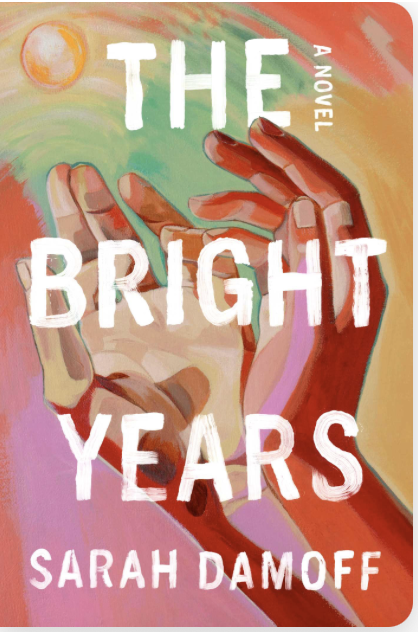
Recent Reviews

The Bright Years by Sarah Damoff
The Bright Years, Sarah Damoff’s debut novel, is my favorite book (thus far) in 2025. The narrative focuses on a multi-generational family navigating the complexities of alcoholism, concealed truths, and personal tragedy. While challenging subjects, the book avoids becoming overly somber, instead presenting a narrative infused with dignity and hope. Damoff’s beautiful prose and insightful observations contribute to the novel’s poignancy and tenderness.
The story follows Lillian and Ryan Bright, who meet in a Fort Worth public library in 1979, fall in love, and eventually marry. Significant aspects of their histories remain undisclosed: Ryan conceals his father’s alcoholism, while Lillian does not reveal that she gave up a child for adoption. Their lives are initially marked by happiness and the birth of their daughter, Georgette. Yet, the convergence of hidden pasts gradually complicates their relationship. As Ryan succumbs to alcohol dependence, the family’s once-bright years begin to darken. Damoff offers nuanced insight into the origins of Ryan’s addiction and skillfully examines its psychological impact on his family.
Despite these adversities, the motif of healing and connection permeates the novel. Lillian Bright’s reflection that “time can wash dirt off a memory until it is revealed as something else entirely” encapsulates the book’s exploration of forgiveness and hope. Through her vivid depiction of complex characters, Damoff emphasizes optimism and compassion amid hardship. The Bright Years shows that healing is possible. 5/5

The Imagined Life by Andrew Porter
Quiet and wise, Andrew Porter’s novel The Imagined Life is a literary and psychological gem. His elegant prose is intimate, layered, and lovely. Porter’s profound exploration of thought-provoking themes, such as the impossibility of understanding one’s parents’ inner lives and the delayed effects of childhood events on adults, draws readers into an intricate web of family dynamics.
Until recently, Steven Mills resided with his wife and son in Berkeley, California. Facing challenges in his marriage and career, he embarks on a quest to make sense of his father’s disappearance. His father had been a distinguished English professor at a Southern California college. In 1984, when Steven was 12 years old, his father disappeared after being denied tenure. The narrative alternates between Steven’s vivid memories of the year preceding his father’s abandonment and his present emotional journey to uncover the truth about his father’s desertion.
Many years had passed without Steven and his mother searching for his father. Their rage and relief seemed to immobilize them. Now, decades later, Steven travels throughout California, meeting with his father’s former friends and colleagues, gathering their perspectives and asking if and where his father might be living. When Steven realizes how deep his father’s abandonment had rooted itself inside him, something shakes free.
Andrew Porter’s nuanced novel delves into loss of innocence, family dynamics, mental health, and secrets. In addition to his beautiful writing, Porter deftly depicts the complexity and contradictions inherent in every person. While the novel’s tone may be melancholy, the ending offers hope that healing is possible. 5/5

The Frozen River by Ariel Lawhon
Midwife Martha Ballard is the heroine of this gripping mystery. She was born in 1735 and died in 1815. This fictionalized account of her life feels authentic and compelling thanks to her diligent daily diary entries and an award-winning biography by Laurel Thatcher Ulrich.
The novel, which has received acclaim for it engaging storytelling, starts as a “who done it” but becomes an homage to Martha Ballard and her commitment to justice and equality for women. The frozen river itself becomes a powerful symbol within the story, representing the rigid societal structures that Martha fights to crack open.
The story opens in 1789, a time of significant change and upheaval for the newly formed United States and its judicial system. Ballard is called to examine the body of a man who was found frozen to death in the Kennebec River. The deceased is identified as one of two well-respected men who were accused of rape two months earlier. As the midwife and healer of Hallowell, Maine, Martha had documented the details of that assault. Martha believes the man was murdered. But when a Harvard-trained male doctor declares the man’s death is accidental, Martha is compelled to investigate. While doggedly delivering babies and healing town folks, she attempts to discover what happened to this man and how it might relate to the rape.
As the story unfolds, Ballard’s unwavering determination to uncover the truth serves as the backbone of the narrative. Ballard’s husband, Ephraim, taught her how to read and write, a skill not available to most women. Their love story is inspiring. Martha’s daily diary becomes a vital tool in piecing together the mystery. Through her investigation, she encounters resistance from powerful figures in the community. Her pursuit of the truth challenges the deeply entrenched patriarchal norms. Her quiet resilience and intellect shine as she navigates a world where women’s voices are often dismissed. How she developed this courage is one of the engaging threads of the story.
Ultimately, “The Frozen River” is more than a murder mystery. It is a profound exploration of courage, justice, and the unyielding resolve of a woman who dared to seek the truth in an age when silence was the easier path. Lawhon’s pays tribute to Martha Ballard’s legacy and her steadfast commitment to gender and class equality. She was truly a heroine of her time. 4/5
